The recent protests in China have rippled well beyond the mainland, to cities around the world with large contingents of Chinese students — even Hong Kong, where the pro-democracy protests of 2019 were crushed and dissent of any kind is now dangerous. Some young people — members of China’s most nationalistic generation in decades, raised on a censored internet in which the ruling Communist Party can do no wrong — have experienced a political awakening, The Times reports:
Nathan Law, a prominent Hong Kong democracy activist who now lives in London, said he had gotten several notes of apology from such people in recent days. “Now we understand completely,” read one message, which he posted online. “Apologies for our ignorance then.”….. Law said …. it would help demonstrators facing the Chinese state to feel less isolated. “Being understood is quite important, because many people might be feeling very lonely and fearful while protesting,” he said.
This “white-paper revolution” likely surprised many inside and outside of China, as it broke out just weeks after Xi’s triumph at the Twentieth National Congress of the Chinese Communist Party, essentially consolidating his rule for years to come and sidelining dissent from within the party leadership, adds Guoguong Wu, a senior research scholar at Stanford University’s Center on China’s Economy and Institutions.
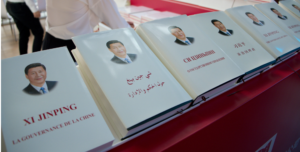
Credit: Forum
Yet this timeline actually helps to explain why the protests are happening now. To this author’s mind, it is the beginning of the Chinese people’s final battle against “Xi Jinping’s new era” of CCP rule, an era notable for the regime’s efforts to turn China into even more of a prison state, he writes for the Journal of Democracy.
Authoritarian regimes, especially those defined by personality cults like that which Xi has purposefully developed, are often rigid and unable to self-correct poor decisions that elections and compromise naturally produce in democratic power transitions, says Kevin Sheives, the deputy director of the National Endowment for Democracy’s International Forum for Democratic Studies.
The 20th Party Congress was not just a coronation of Xi Jinping, but also a coronation of his ideology and rigid methods of governing, he writes for the Forum’s Power 3.0 blog. Within China, the Party uses a mix of incentives to induce cooperation, eliminate dissent, and demand expectations of unquestioned support from the Chinese population to maintain its hold on power. Like other dictators, those same expectations that Xi expects from the Chinese people are likely to become those he places on the rest of the world.
 Uyghur human rights lawyer Rayhan Asat said that the protests “present a real but limited opportunity to open the eyes of the Han to what we’ve been going through.” She had spoken to Chinese students who were outraged by the Urumqi fire but continued to defend the camp system in Xinjiang.
Uyghur human rights lawyer Rayhan Asat said that the protests “present a real but limited opportunity to open the eyes of the Han to what we’ve been going through.” She had spoken to Chinese students who were outraged by the Urumqi fire but continued to defend the camp system in Xinjiang.
“Imagine if they protested against all forms of illegal detention and denounced the concentration camps. We’d see results,” she said. “After this tragedy, Chinese people cannot pretend they don’t know,” Asat added, echoing comments made to a recent National Endowment for Democracy (NED) forum.
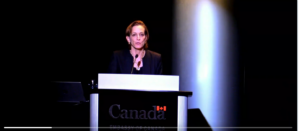 Pulitzer Prize-winning historian Anne Applebaum (right) last week called on democracy advocates to form new networks of solidarity. Mutual support is essential for confronting affluent autocratic alliances that act more like a business agglomeration – Autocracy, Inc. – than nation states, she said, delivering the 19th annual Seymour Martin Lipset Lecture, sponsored by the Embassy of Canada and the National Endowment for Democracy (NED).
Pulitzer Prize-winning historian Anne Applebaum (right) last week called on democracy advocates to form new networks of solidarity. Mutual support is essential for confronting affluent autocratic alliances that act more like a business agglomeration – Autocracy, Inc. – than nation states, she said, delivering the 19th annual Seymour Martin Lipset Lecture, sponsored by the Embassy of Canada and the National Endowment for Democracy (NED).
“Mr. Xi is in a crisis of his own making, with no quick or painless route out,” the Economist observed this week. “New Covid cases are near record levels. The disease has spread to more than 85% of China’s cities. Clamp down even harder to bring it back under control, and the economist costs will rise yet higher, further fueling public anger. Allow it to spread and hundreds of thousands of people will die… China’s leaders appear to be searching for a middle ground, but it is not clear there is any.”
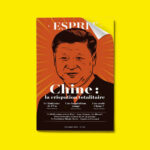 Students, residents, lawyers and workers are still challenging China’s Covid-19 restrictions, even though the intensity of the political chants has been dialed back, The Times reports:
Students, residents, lawyers and workers are still challenging China’s Covid-19 restrictions, even though the intensity of the political chants has been dialed back, The Times reports:
As the authorities mobilized to detain protesters and search residents’ phones in recent days, often without clear justification, legal advice has circulated on the Chinese internet. One such article outlined citizens’ rights in the event that a police officer demands to search their phones. In that article, the author, who belongs to a Shanghai law firm, invokes the Chinese Constitution and concludes: “Arbitrary content checks of citizens’ cellphones are a serious infringement of citizens’ privacy and an abuse of public power.”
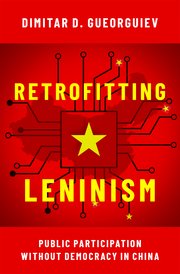 “I think what’s going to happen is people will coordinate, it will be low-level, it will look individualized and spontaneous, but there will be learning and discussion behind the scenes,” said Mary Gallagher, a professor at the University of Michigan. “That’s what you need to do in a politically repressive environment. It’s really going to put pressure on the local governments not to lock down.”
“I think what’s going to happen is people will coordinate, it will be low-level, it will look individualized and spontaneous, but there will be learning and discussion behind the scenes,” said Mary Gallagher, a professor at the University of Michigan. “That’s what you need to do in a politically repressive environment. It’s really going to put pressure on the local governments not to lock down.”
The marches and protests have been some of the most widespread and openly political since those of 1989, which Beijing put down with lethal military force at Tiananmen Square, The Times reports. Now Chinese authorities can smother unrest by using the high-tech dragnet to target organizers and the most outspoken malcontents and detain them. Followers and onlookers often get away with a stern threat.
“We’re hearing stories of police turning up on people’s doorsteps asking them their whereabouts during the protests, and this appears to be based on the evidence gathered through mass surveillance,” said Alkan Akad, a China researcher at Amnesty International. “China’s ‘Big Brother’ technology is never switched off, and the government hopes it will now show its effectiveness in snuffing out unrest,” he added.
“Freedom does not fall from the sky.”
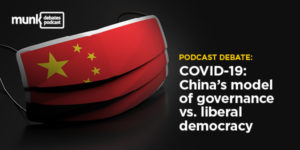 Just six weeks ago, Xi Jinping’s ’s authority seemed all but unassailable, CNN’s Nectar Gan reports:
Just six weeks ago, Xi Jinping’s ’s authority seemed all but unassailable, CNN’s Nectar Gan reports:
He secured a groundbreaking third term in power, moved politically more moderate leaders into early retirement, and stacked the new leadership with staunch loyalists – including some of the most faithful enforcers of his zero-Covid strategy. That image of unquestioned and absolute control was pierced late last month by an explosion of dissent from residents, migrant workers and university students who’d had enough.
“There will be no compensations, no apologies, no discovery of the truth, just moving on,” a Beijing resident posted on Weibo, in a reference to the protesters. “What can lock us down can also easily unlock us. How terrifying is this capricious power, and when will it overturn your life again? I don’t celebrate, I just remember those brave friends with gratitude.”
“Freedom does not fall from the sky.”
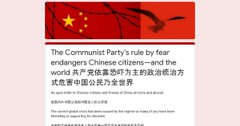 The German economy ministry is recommending excluding using components from providers from authoritarian states in critical infrastructure and imposing stricter requirements for firms dealing with China, according to a new strategy paper, Reuters reports:
The German economy ministry is recommending excluding using components from providers from authoritarian states in critical infrastructure and imposing stricter requirements for firms dealing with China, according to a new strategy paper, Reuters reports:
German firms particularly exposed to China should share details on that business with the government and undergo regular stress tests, according to the ministry’s “Internal Guidelines on China”, marked confidential.
“The importance of China as an export market for many German industrial sectors as well as critical dependencies in certain … areas could make Germany vulnerable to blackmail and restrict its political capacity to act,” the document said.
The white-paper protests #A4Revolution have changed the dynamics of #China’s political development by opening a path for the country that differs markedly from Xi’s intended path, @guoguang_wu @Stanford‘s @SCCEI writes for @JoDemocracy. https://t.co/jVO6cyUr7s
— Democracy Digest (@demdigest) December 6, 2022







